The Last Airbender (2010, dir. M. Night Shyamalan)
Oh God make it stop
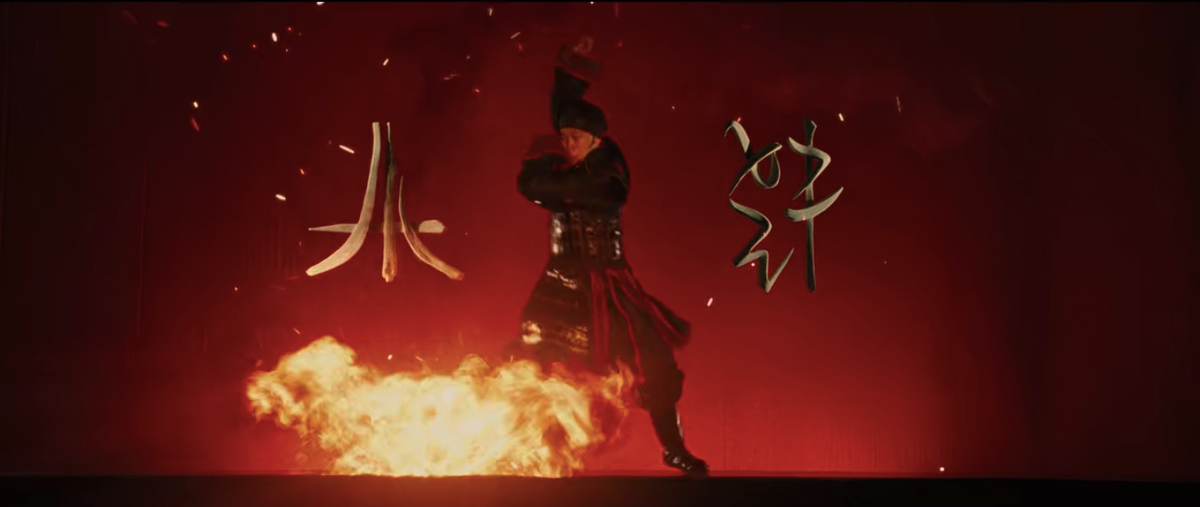
(This is the eighth installment of my weekly recaps of Avatar: The Last Airbender, the Nickelodeon animated series that ran from 2005 to 2008 to much critical acclaim. I’ve never seen it! These recaps are typically only available to paid subscribers, but you, lucky you, get to read this recap of the awful 2010 movie for free!)

If you have to recreate the opening credits, why do you then just do Katara’s voiceover again, but make it longer and more boring? (Credit: Paramount)
Most bad movies aren’t so bad they’re good. Most bad movies are just mediocre and boring.
I’m paraphrasing, but that’s what my good friend Angie Han (of Mashable fame) said after I subjected her and Cassie LaBelle (my Avatar viewing companion) to The Last Airbender, M. Night Shyamalan’s 2010 adaptation of the first season of Avatar: The Last Airbender. Angie is a terrific film critic; Cassie once taught actual film classes. If any two of my friends were going to descend with me into Hell, I’m glad it was them. This piece contains my thoughts, but I’m peppering in a few tidbits from them throughout, because the least I can do after subjecting them to this is let them show you how smart they are.
So this movie? It’s one of the worst movies I’ve ever seen, but not in a way that’s fun to talk about. It’s boring and inert, and nothing about it pops off the screen. It’s somehow simultaneously an attempt to cram 20 episodes of plot into 100 minutes (give or take) and a story that completely changes aspects of that plot for no discernible reason. Watching it, you’d have no idea that Shyamalan is actually pretty good at staging suspense or directing actors. You’d also have no idea that he’s apparently a big fan of the cartoon, because everything about this movie screams “director for hire job.” Shyamalan has made other bad movies, but he’s never made another movie this soulless.
Okay, there’s one thing that maybe comes close to “so bad it’s good” — the visual effects. But that’s me really stretching the definition of “so bad it’s good.” “The visual effects were awful,” Cassie said a day after we watched the film. “It wasn't even just the age of them — this is a 2010 film!!! — it was how the bending felt slow, cumbersome, and really just looked unfinished. This wasn't helped by anything else the film was doing visually, but they actively hindered nearly every scene they were in, especially in combat. Also: scary Appa was unforgivable.”
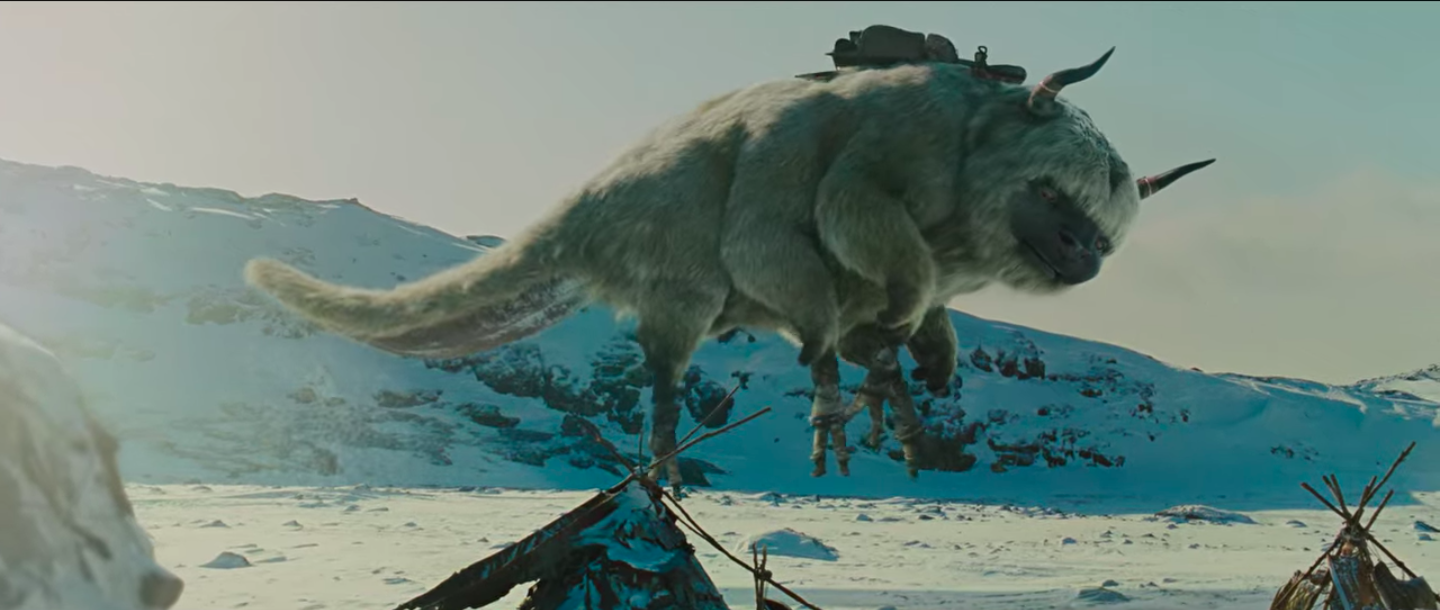
I spent a fair amount of season one of the TV show being a bit bored by the action. But at least I was always invested in watching it. Compare even the worst season one action sequences to, uh, this.
For some reason, Shyamalan shoots the above mostly in a single shot, which drifts around this Earth Nation village, showing us the different styles of bending. This is potentially a cool idea and a good grounding in the world of the series for the uninitiated. But the scene itself is paced so slowly. There’s no momentum, and the whole thing just sits there, with all the tension of a lazy afternoon.
This scene underlines something else inherent to the film: Shyamalan doesn’t trust the audience to figure anything out, so he has all of his characters constantly explain what’s going on. (At one point, a tiny child comes up and tells Zuko his own backstory.) Paradoxically, this makes the film harder to understand. You never have any emotional investment in the dramatic stakes because the characters are always telling you that you should have investment in the dramatic stakes.
“The script is 99 percent people explaining the plot to each other, and I still felt like I had no idea what was going on,” Angie said.
What’s so weird about this is that if you were willing to ditch a bunch of elements of the show’s first season — a necessity when shrinking the story down this much — its basic spine would make a great movie. It’s a chase narrative after all. It’s not hard to imagine Aang, Katara, and Sokka staying one step ahead of Zuko as they dart their way to the North Pole. That might change the plot of the first season too much for purists, but it would be worlds better than this half-assed story that attempts to have one foot in both worlds.
“The movie felt like a 70-minute prologue to an adaptation of the final episode of season one. One of the only scenes we get before the last act of the film with any room to breathe was the Blue Spirit sequence, which is almost entirely unmotivated without more than a brief peek into Zuko's backstory,” Cassie said.
Indeed, the movie decides to adapt Yue’s arc from the first season finale — a good call, theoretically, since it’s so powerful — but it doesn’t really bother to give you a sense of why she’s interesting or important, beyond making her ethereally beautiful. Which, sure, but also… shouldn’t there be more to her?
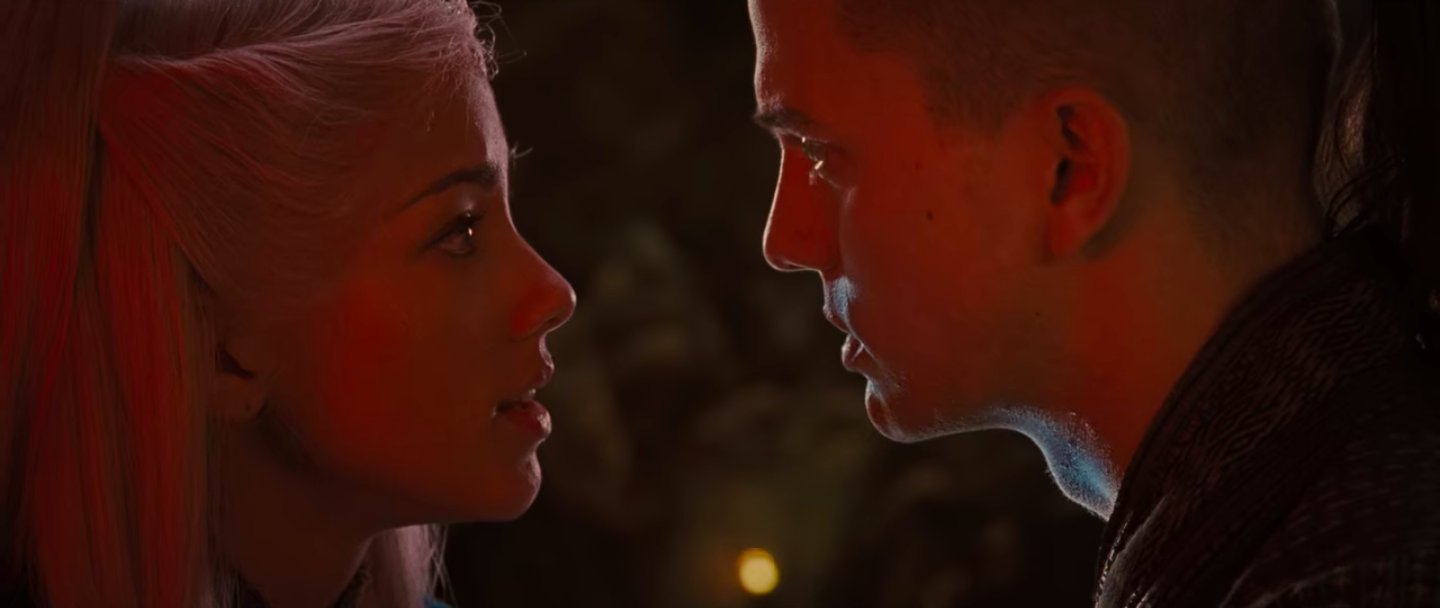
But even when the film is more or less directly adapting the show, it makes changes that weaken the material. The idea that we’d rather watch Aang raise a giant wall of water than see him turn into a giant salamander golem thingy is ridiculous. The whole thing ends up feeling like pointless CGI spectacle, where the cartoon had soul.
What’s really weird about this is how the story simultaneously makes no sense for fans of the show or for people who’ve never seen the show to begin with. I could really only follow the story because I could keep comparing it to the TV show, but that also left me wondering just why the movie was doing anything, which left me feeling utterly detached from the story. And yet when the podcast Blank Check took on this film, co-hosts Griffin Newman and David Sims (who hadn’t seen the TV show) were similarly baffled. Just who is this movie for anyway?
(Another thing that we all harped on endlessly: Why change the pronunciations of the characters’ names? Aang is pronounced “Ong,” and Sokka is pronounced “Soh-ka,” and why???)
The film spurred controversy well before it was even made, thanks to the casting of a trio of white kids in the main roles. Noah Ringer plays Aang, Jackson Rathbone plays Sokka, and Nicola Peltz (of Transformers and Bates Motel fame!) plays Katara. (Amusingly, Shyamalan apparently said that when he cast Peltz, it was the first time he felt as strongly about a performer as he had when he cast Haley Joel Osment in The Sixth Sense, which sure.) (Also, Angie informed me that Peltz is the daughter of a billionaire, which just makes so much sense if you think about it.) And, yes, these are all white actors, playing characters who are loosely coded as being of Tibetan (Aang) or Inuit (Katara and Sokka) descent in the series, and yes, the primary actors of color are all playing the bad guys. That’s a huge, huge own goal the film didn’t need to score on itself.
But it is entirely possible you will completely forget about the problems with the casting once the actors actually start performing, because they’re all so. Boring.
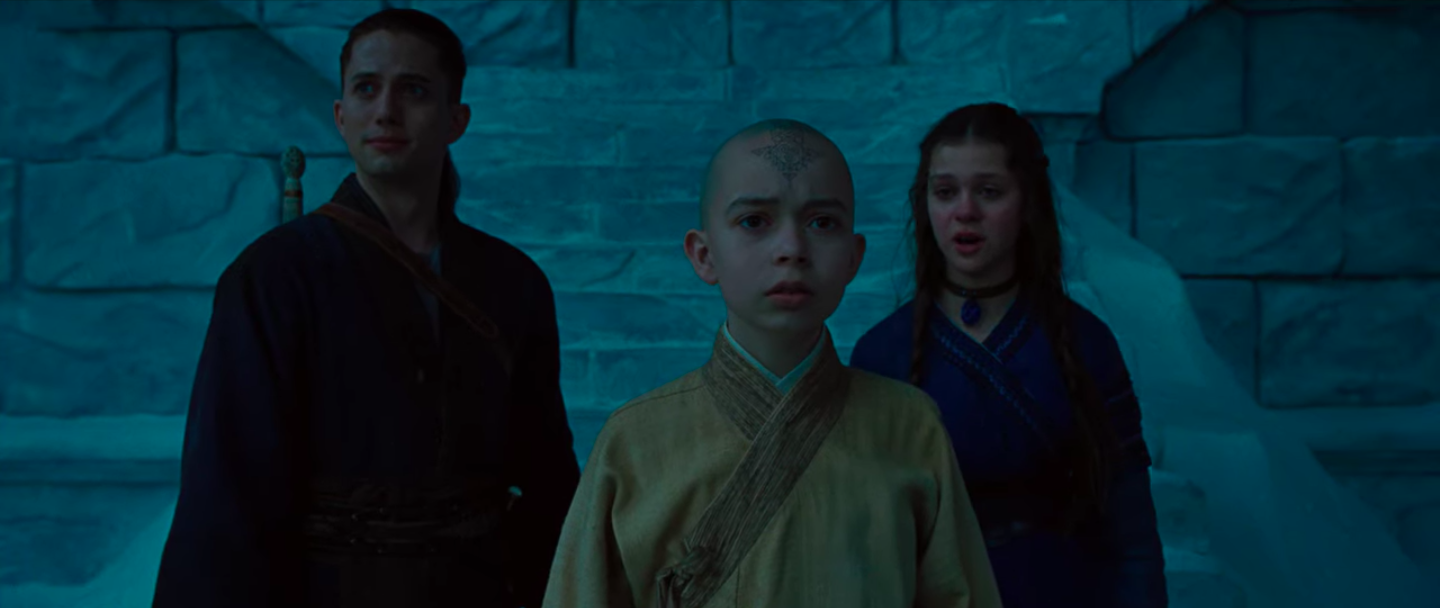
Like, yes, it’s not a great idea to cast Dev Patel as the story’s main villain, but at least he’s a compelling performer, doing his best with the material he’s been handed. If you’re a fan of Katara or Sokka… you’re kind of out of luck. They end up being observers of the plot, rather than participants in it. Patel at least has the energy to lift off the screen a tiny bit. Peltz and Rathbone end up feeling completely lost.
“All the lead actors seem like they've never acted before. (Well except maybe Dev Patel, who is...fine.) Which isn't even totally their fault, since all the dialogue they're being asked to perform is so mind-numbingly dull,” Angie said, before adding that she felt the film had done a grave disservice to her favorite, Sokka. (She wished to append this gif.)
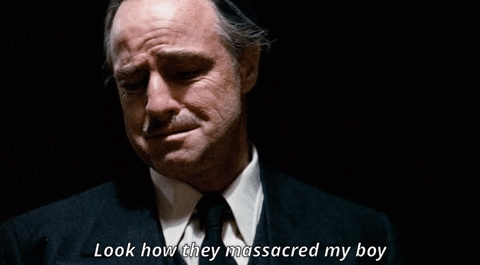
Now I’m just going to share some thoughts Cassie and Angie had that I thought were smart, before we pretend none of us ever saw this movie!
Cassie: I don't know if the cinematography or the editing was more at fault, but the film looked very flat. A lot was in simple shot/reverse or else distracting oners that somehow made the action feel slower than it was.
Angie: The movie demonstrates no understanding of why people like this show, or even what it's about beyond its basic plot points. It's faithful to a fault and yet completely missing the warmth, humor, and emotionality that make this series come to life. It's a hollowed-out zombie version of the show, technically recognizable as an adaptation but so lacking in every way that matters, that the kindest thing you can do just kill it in its tracks.
So three thumbs up?
Okay, also, I asked everybody their favorite part. Here are our answers.
Emily: I kind of liked the couple of times Summer Bishil was onscreen as Azula, because I remembered The Magicians, which was a great show.
Cassie: The one steadicam shot of Aang and Katara working on bending stances together at the north pole that ends with ashen snow foreshadowing the Fire Nation attack.
Angie: Aang's tattoos looked neat. Is that an acceptable answer?
Yes. Yes, it is. And they do kinda look neat.
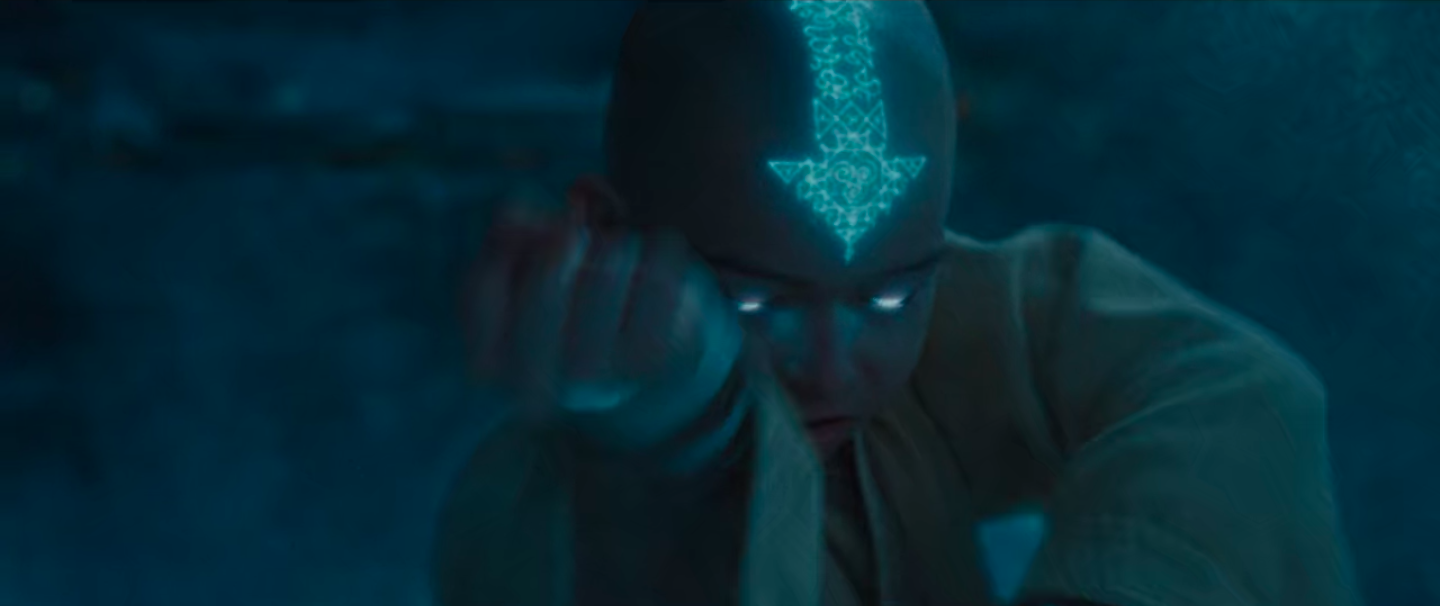
Next week: I’m finally going to start season two of the show! I never imagined how much I would be looking forward to it, but the combination of the season one finale and this movie have made me ravenous.
After season two: I threatened to have Cassie and Angie watch James Cameron’s Avatar with me as a bit, but now I think I might actually do it?? Talk me out of it.



